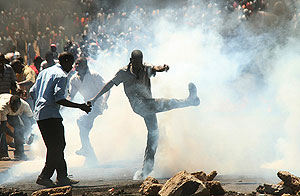Kenya’s whistleblowers face growing intimidation
Victor is afraid. Twice last year he told panels investigating the violence that shook Kenya after a rigged vote in 2007 how leaders of his own Kalenjin tribe had whipped up ethnic tension, and paid boys to kill people and torch homes. His testimony helped prove that the violence was a well-organized political power play rather than some paroxysm of tribal rage. But now, like many others who testified alongside him, Victor (not his real name) gets text messages threatening him with death. He can’t find work, other Kalenjin shun him, and strange men attacked his eight-year-old son as the boy walked back from school a few days ago.

Images from the Kenyan post-elction violence
